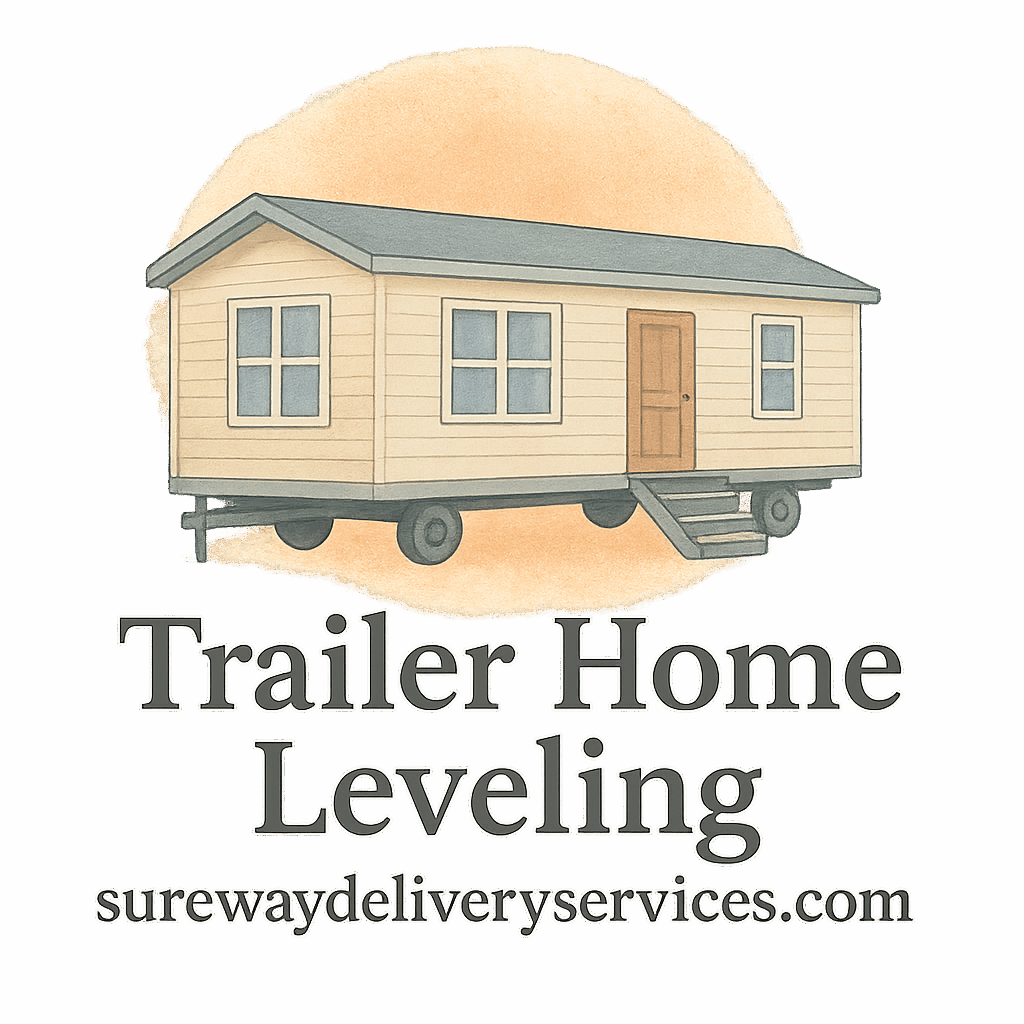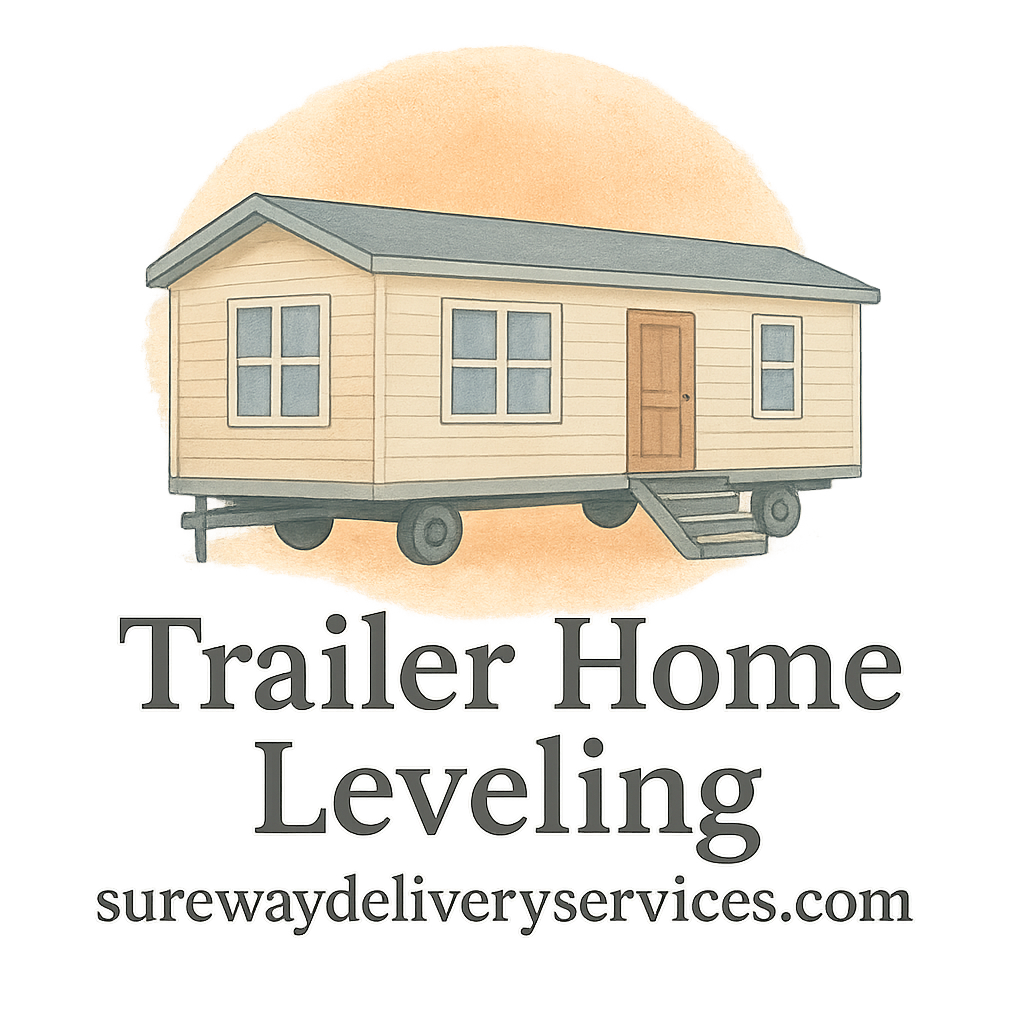Introduction
You walk into your trailer, and something feels… off. Maybe it’s that door that won’t shut all the way or the way your floor feels like a funhouse ride. While it’s tempting to shrug it off, these could be red flags screaming, “Hey! I need home leveling!”
This guide dives into the 10 clear signs your trailer needs home leveling and what you can do about it—because ignoring the problem won’t make it disappear (trust me, I’ve tried).
What Is Trailer Home Leveling?
Trailer home leveling is the process of adjusting your trailer so it sits evenly on the ground. Sounds simple, right? But it’s a critical part of owning a trailer.
Why Is It Important?
If your trailer isn’t level, you’re not just dealing with inconvenience—you’re risking serious damage to your home’s structure, plumbing, and even your peace of mind.
Want a deeper dive into leveling basics? Check out this helpful introduction to trailer home leveling.
Sign #1: Doors and Windows Stick or Won’t Close Properly
Ever had to wrestle your door closed like it’s a stubborn mule? If your doors or windows stick or pop open by themselves, it’s a clear sign your trailer has shifted.
This is one of the top signs people notice first—and for good reason.
Sign #2: Cracks in Walls or Ceilings
Small cracks might seem innocent, but they often scream, “foundation issues!”
Hairline vs. Structural Cracks
Hairline cracks may just be cosmetic, but diagonal or jagged ones—especially near windows and doors—can indicate major leveling problems.
If you’re seeing cracks, schedule an inspection before things get worse.
Sign #3: Uneven or Sloping Floors
Do marbles roll across the floor when you drop them? Feel like you’re walking uphill to your kitchen?
How to Test Floor Leveling
A simple level tool—or even a ball—can reveal uneven flooring. If the slope is noticeable, leveling is likely overdue.
Check out the right techniques and methods for verifying the slope.

Sign #4: Skirting Gaps Around the Base
That skirt around the bottom of your trailer shouldn’t look like it’s trying to escape.
Large or uneven gaps around the skirting may indicate that one side of your trailer is sinking or rising—classic signs you need to re-level.
Sign #5: Water Pooling Underneath Your Trailer
Water under your trailer is a double whammy: it might be a cause and result of leveling issues. Moisture can erode your foundation supports, leading to unbalanced weight.
Don’t ignore puddles—learn how drainage affects your trailer.
Sign #6: Loose or Squeaky Anchors and Jacks
If your trailer’s jacks or anchors creak when you move or feel wobbly, that’s a major red flag.
The Role of Jacks in Leveling
Jacks are essential tools in keeping your trailer level. Any signs of them loosening means it’s time for a check-up. Visit our resource on jacks and leveling tools for more.
Sign #7: Plumbing Issues and Drainage Problems
You’d be surprised how much a tilt can mess with your pipes. Water doesn’t flow right when gravity isn’t in your favor.
Why Water Doesn’t Flow Right When You’re Not Level
Slow drains, backups, or strange gurgling sounds are all symptoms that your home might be off-kilter.
This is one of those hidden issues people forget—until their sink becomes a swamp. Visit trailer-maintenance tips to prevent costly repairs.
Sign #8: Gaps Around Doors or Cabinet Misalignment
Misaligned cabinets or visible gaps around doors are like the crooked smile of a trailer crying for help. Don’t ignore them.
They often pair with sticking doors, but the visual is more obvious. Think of it as your home pulling a weird yoga pose it wasn’t meant for.
Sign #9: Strange Sounds—Creaking, Shifting, Popping
Homes shouldn’t sound like they’re stretching after a nap. Creaks and pops often mean your trailer is under stress.
These sounds may signal internal pressure from shifting supports, which could lead to costlier issues.
Find advice and real customer reviews from others who heard the warnings too late.
Sign #10: Gut Feeling Something’s Off
Sometimes you don’t need proof—your instincts tell you. And guess what? You’re probably right.
If you find yourself second-guessing the level of your trailer, it might be time to consult a leveling service.
What to Do If You Notice These Signs
Don’t Delay: Safety First
A tilted trailer is not just uncomfortable—it’s unsafe. Cracked frames and broken pipes can cost thousands.
DIY or Hire a Pro?
Some handy folks prefer a DIY route, but unless you’re experienced, it’s best to contact professionals. Need budgeting help? Explore cost and budgeting info.
Choosing the Right Trailer Leveling Service
What to Look For in a Contractor
- Licensed & insured
- Positive customer reviews
- Detailed service estimates
Explore different service packages to know what fits your needs.
Red Flags to Avoid
- Vague pricing (watch for overcharges)
- Poor communication
- No contract
Regular Maintenance to Prevent Future Leveling Issues
Routine inspections are your best defense. Consider a checklist for annual checks.
Visit our complete trailer maintenance guide to stay ahead of costly problems.
Conclusion
Your trailer deserves to be as grounded as you are (pun intended). Ignoring the signs could lead to bigger—and more expensive—problems down the road.
Leveling isn’t just a maintenance issue; it’s a safety and quality of life issue. If you’ve noticed one or more of the signs above, it’s time to act.
Use our resources to make informed decisions and keep your trailer home feeling like, well… home.
FAQs
1. How often should I check my trailer’s leveling?
At least once a year or whenever you notice new cracks, sticking doors, or shifting noises. Check out our annual inspection tips.
2. Can I level my trailer myself?
Yes, but only if you’re confident and have the right tools. Otherwise, hire a professional.
3. What’s the average cost of trailer home leveling?
It varies but expect anywhere from $500–$3,000 depending on size and damage. Visit our cost and budgeting guide.
4. Do I need to re-level my trailer every year?
Not necessarily, but annual inspections are crucial to catch issues early.
5. What tools do I need for basic leveling?
Level, hydraulic jacks, blocks, and patience! Learn more in our tools guide.
6. Will insurance cover leveling costs?
It depends on your policy. Some insurance might cover if leveling issues cause structural damage.
7. What’s the worst that can happen if I ignore it?
Broken plumbing, cracked walls, unsafe living conditions—avoid those by taking action early. Read our success stories from people who did.


